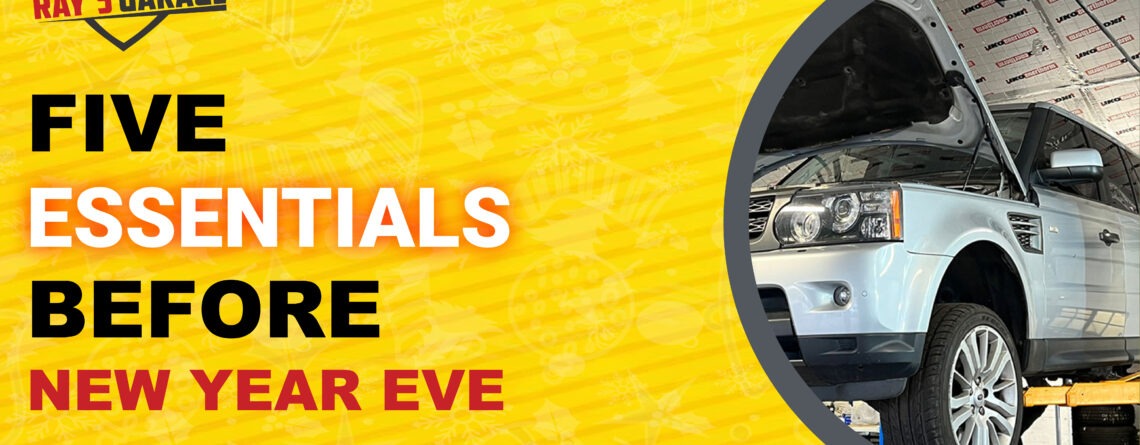The excitement of traveling on an exciting journey can be experienced on road trips. And while there are numerous ways of celebrating New Year’s Eve, none can compare to the amazing feeling of being liberated on the wide highway distant from the busy city. Even the most meticulous travel plans can’t save a car from a lack of regular maintenance, so prepping your car in advance is the best way to ensure that your road trip is delightful and carefree. Therefore, it’s essential to carry out routine maintenance tasks as well as other preparing maintenance tasks before leaving for an exciting New Year’s party. Here are our top suggestions for preparing the car for the upcoming trip.
Check the Oil
Your engine’s oil is crucial to the lubrication of its working components and, consequently, to the engine’s long-term health. If your car’s oil seems to be either old and decaying or merely at a reduced level, you’re more likely to crash in a far-off location.
Therefore, one of the many important and basic routine maintenance for an owner to complete is monitoring the engine oil in a car.
There are several compounds in modern motor oil that improve lubrication and maintain the greasing system clean, but they can decrease with time. An unusual oil loss or utilization could be an indication of more serious issues. The kind of oil to use and how frequently it has to be refreshed will be specified in the owner’s guide.
Check the Tyres
One of the most frequent causes for drivers to contact the towing company is a punctured tire. Ask a qualified mechanic to check your alignments and tires, including the backup, to help prevent a flat-tire catastrophe. Additionally, make absolutely sure they are of the kind and size recommended by the manufacturer. Moreover, they must be correctly inflated, have even treadwear, are free of any evident problems, and have no obvious flaws.
A tire check comprises of:
Air pressure
Checking tire pressure at once every 1000 miles is recommended. A tire that is either under or over-inflated can cause a number of problems, including a rough ride, early wear, heating, and, most troubling of all, a tire rupture.
Tire Wear
You can’t rely on your tires to provide stability on the road if the tread doesn’t seem to be deep enough or there is excessive wear. To make sure that the tire’s structural strength is not jeopardized, professionals should examine bulges, cuts, and other visibly evident damage.
Tire Rotation
Even if your tires are properly inflated, varied suspension settings, weight distribution, and road conditions cause tires to deteriorate at various rates. Therefore, you must rotate your tires every 5,000 to 8,000 miles, or as rapidly as you detect that one part of the tread on the tires is wearing down noticeably more quickly than the other.
Check the Coolant
The radiator circulates coolant or antifreeze through a network of tubes and valves to cool your machine. Your engine could boil if you don’t have enough fluid, leaving you stranded in an unfamiliar area of the country. Watch for any indications of a coolant problem before your engine overheats. Checking your coolant level regularly will help you avoid any potentially harmful situations, just as you ought to do with your oil.
Funneling tap water into the radiator to use as engine coolant is not sufficient; you need to use a specified combination of deionized water and antifreeze. Conversely, add quality engine coolant to the top.
Check your Engine Air Filter
The engine air filter keeps debris, dust, and other impurities out of the engine. Long-distance driving on New Years’ Eve with dirty filters will keep the interior and engine of your automobile from receiving fresh air. Consequently, the health of the engine, fuel consumption, and sinuses will experience long-term negative effects. For optimum on-road performance, make sure the air filter is fresh and free of debris. The good news is that replacing engine air filters yourself doesn’t require special skills and is also reasonably priced.
Check the Brake Pads
Your car can slow down and stop by using friction from the brake pads. Eventually, they become too frail to function properly as they deteriorate with use. Since they generate an obnoxious screaming or shrieking sound when there isn’t enough pad material left, it is typically clear that they need service or replacement. Replace them and have them checked by a qualified auto technician like those at Ray’s Garage. Brake pads should be replaced every 25,000 to 70,000 miles, according to auto maintenance professionals.
Get Help From Professional Services
You might neglect to check some of the car’s parts out of enthusiasm to travel for the New Year’s party. Therefore, it is essential to have a car mechanic give your vehicle a full inspection. For your vehicle’s maintenance, consider Ray’s Garage, a reputable service facility.







